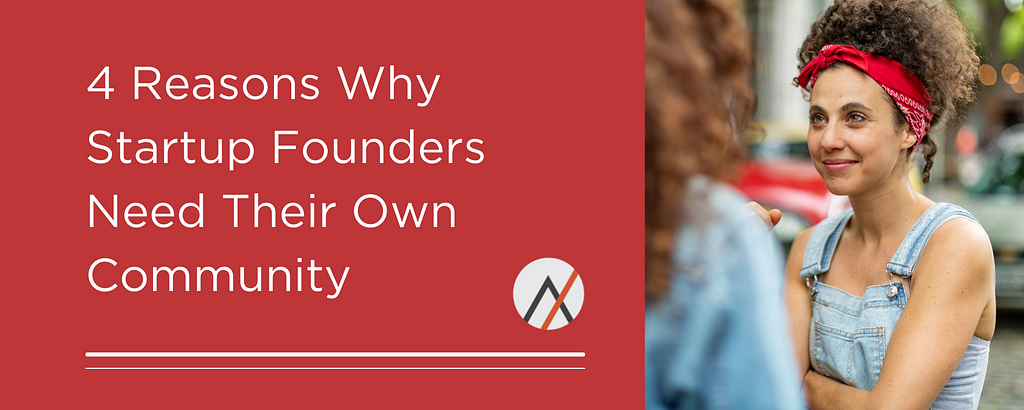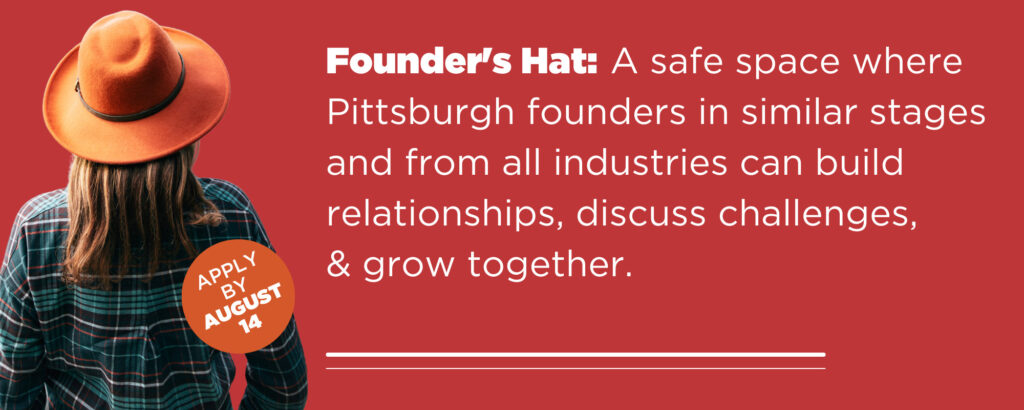Build, Grow, & Thrive with Other Founders

Startup founders wear dozens of hats. You aren’t just a founder — you’re also an accountant, marketer, policy developer, family member, partner, and the list goes on. Entrepreneurship is hard. We’d bet that starting a business exposes you to your highest highs and your lowest lows.
Entrepreneurship is often a lonely experience, but it doesn’t have to be. Finding a community of other founders to share your wins, resolve your challenges, and brainstorm solutions can ease you through your journey.
Here are four reasons why startup founders should build a support network of other entrepreneurs (& apply to our Founder’s Hat program by August 14, 2023):
1. Your Family & Friends Don’t Always Get It
We love ’em, and they support us in so many ways. But friends and family members who haven’t experienced entrepreneurship firsthand can’t fully grasp the myriad of responsibilities, pressures, and anxieties that come with founding a company. So even though they bring you your 13th cup of coffee as you stay up past 2 AM, their experiences of entrepreneurship are different.
They’re talented experts in their own fields but don’t always know the info you’re looking for on the professional side. Without launching or scaling a business, it’s hard for them to provide tips on talking with investors, bootstrapping your research and development, marketing a new product on a shoestring budget, or recruiting a talented team when you’re going up against Fortune 500 companies for the same talent.
Excuse our sports analogy, but here it goes: If entrepreneurship were football, your friends and family would be your biggest cheerleader, but when you want to talk gameplay, you need someone who understands the plays and has been sacked a few times.
Founders need to connect with others who are going down the same path or have been there before.
2. Mental Health Matters
We’ve talked about this before: According to the Canadian Mental Health Association, 62% of business owners say they feel depressed at least once per week, and 54% say their stress impacts their workday. Moreover, it’s probably no surprise that all of those late nights and early mornings of working by yourself to build a business means that entrepreneurship can be incredibly socially isolating.
It’s essential to find healthy ways to cope with the stress and isolation of starting a business. One proven remedy is unfiltered conversations with others who’ve experienced the ups and downs of entrepreneurship. Unfortunately, this usually doesn’t happen at the routine networking event. Instead, try to tap into a community of other founders to help you build authentic relationships and connections.
And remember, if you find that you need extra support, you should seek help from a mental health professional in your area (possibly one whose specialty is working with entrepreneurs and business owners).

3. Your Employees Can’t Support You (In This Way)
Having a good relationship with your employees also means having boundaries around sharing your personal and professional matters.
Although you work together as a team, it’s not an employee’s responsibility to help you handle your emotions when you’re overwhelmed or unsure how to balance the demands of work with the demands of your personal life. Being a good leader also means knowing when and who it is appropriate to bring into certain conversations, and that’s not always members of your work team, especially folks you supervise.
That said, it can make it difficult to feel supported when there’s no one to commiserate with at work. The Atlantic reports, “People at the top often miss out on workplace friendships, and they may suffer mightily as a result. According to one finding in the Harvard Business Review, for example, half of CEOs experience loneliness on the job, and most of them feel loneliness hinders their work performance.”
A network of other founders can be, and often is, the best space to seek out the advice and support that your employees can’t supply.
4. It’s Challenging to Develop a Long-Term Network
Networking events are a dime a dozen. They can be great, but they can also be a difficult setting for establishing real relationships. We know that entrepreneurs, in particular, feel the pressure to be perceived as successful and “having it all.” Unfortunately, networking gatherings can heighten these feelings and lead to superficial, cursory relationships.
The Harvard Business Review even recently suggested skipping traditional networking events altogether, suggesting solutions that give you more ability to control and fine-tune who you speak with.
Focusing on a founder-specific space where you can take deep dives on whatever you’re experiencing and ask genuine questions of people who also “get it” is one way to form longer-lasting, deeper connections.
Good News: There’s a Resource for Pittsburgh’s Entrepreneurs
Our Founder’s Hat program is a safe space where founders in similar stages and from all industries can build relationships, discuss challenges, celebrate accomplishments, and grow together. Plus, you’ll gain new skills and learn from serial entrepreneur and Ascender Senior Advisor Craig Markovitz. Together, founders will leverage the power of community and different perspectives to build, grow, and thrive.
APPLY by August 14, 2023 to join the latest cohort and begin building your own community of startup founders!
Connect with us
Learn more about Ascender: https://ascenderpgh.com/
Sign up for our newsletter or send us a note: info@ascenderpgh.com
Follow us: Twitter — Facebook — LinkedIn — Instagram
From fledgling tech companies, healthcare innovators, and nonprofits to makers, creators, services and shops, Ascender is for Pittsburgh’s entrepreneurs. We help businesses of all types in the Pittsburgh region start and build a business through education and connectivity. See how Ascender can help you.
4 Reasons Why Startup Founders Need Their Own Community was originally published in Ascender on Medium, where people are continuing the conversation by highlighting and responding to this story.

